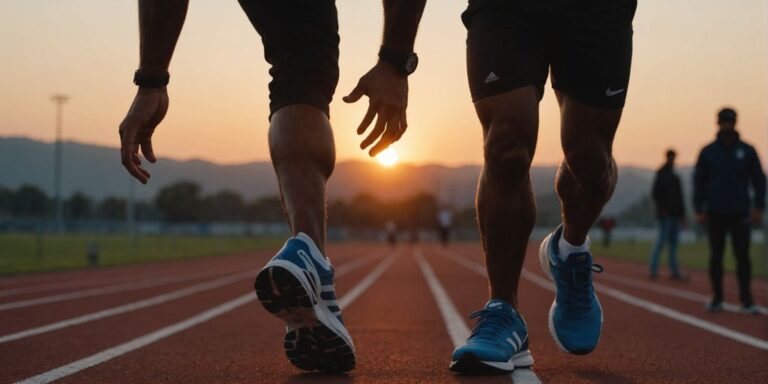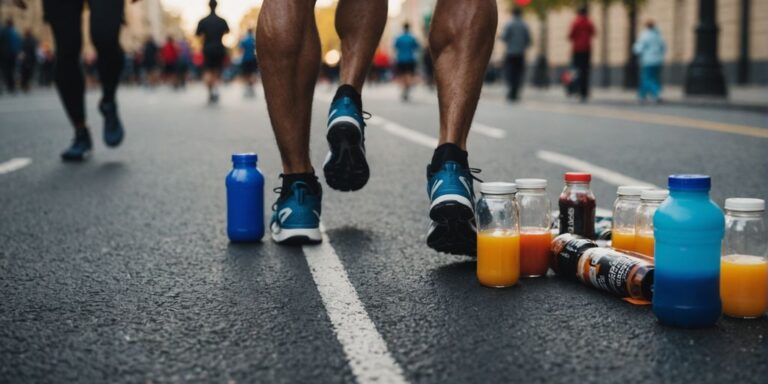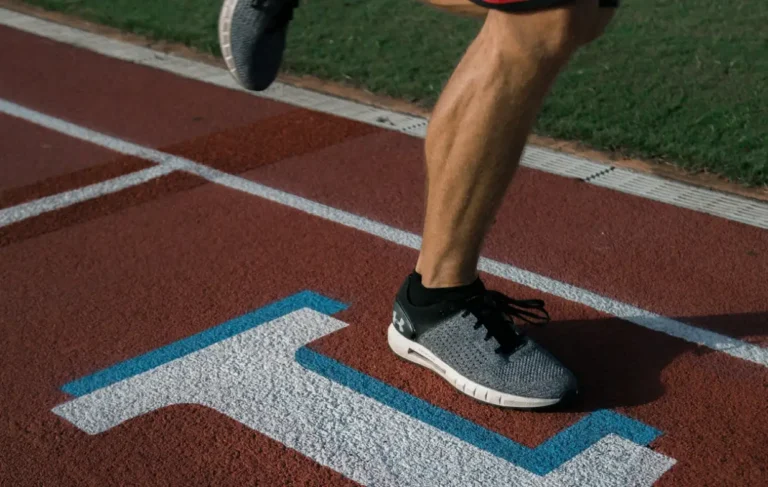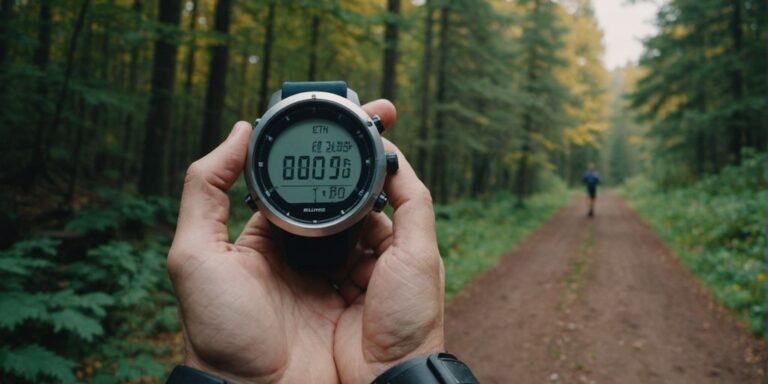What to eat before half marathon
Preparing for a half marathon isn’t just about the miles you log; it’s also about what you eat. The right foods can give you the energy you need to cross the finish line strong. This guide will help you choose the best meals and snacks to fuel your body before race day.
Key Takeaways
- Choose a balanced dinner with complex carbs, lean proteins, and healthy fats the night before the race.
- Avoid high-fiber, greasy, and sugary foods the day before to prevent stomach issues.
- Opt for a carb-focused, easy-to-digest breakfast on race day, eaten 3-4 hours before the start.
- Include high-carb snacks and stay hydrated with water and electrolyte drinks before the race.
- Test different foods during training to find what works best for your body.
The Best Dinner Choices for the Night Before
Preparing for a half marathon involves more than just training; your dinner the night before is crucial. Here’s what you should focus on:
Complex Carbohydrates to Fuel Your Run
Carbs are your best friend before a race. They help stock up your glycogen stores, which you’ll need for energy. Think about having a pasta dinner, like pasta and meatballs with a simple marinara sauce. Potatoes are also a great option, whether baked or mashed.
Lean Proteins for Muscle Repair
Protein helps repair and build muscles, which is essential after all that training. Grilled chicken and rice make a balanced meal. If you prefer something different, a lean burger with a side of sweet potato fries can also do the trick.
Veggies and Healthy Fats for Balanced Nutrition
Don’t forget your veggies and healthy fats. A side of steamed broccoli or a mixed salad can add essential vitamins and minerals. Healthy fats like those found in avocados or olive oil can help you feel full and satisfied without feeling heavy.
The goal is to go to bed feeling satisfied but not stuffed. A light case of excited butterflies in your stomach is just fine.
Remember, the best dinner is one that you are familiar with and that sits well with you. Stick to foods you know and love to avoid any surprises on race day.
What to Avoid Eating the Day Before
High-Fiber Foods That Can Cause Discomfort
While high-fiber foods are great for your health, they can cause bloating and digestive issues if eaten right before a race. Foods like lentil pasta, raw broccoli, and Brussels sprouts are best avoided. Instead, opt for lower-fiber options like ripe bananas and well-cooked veggies.
Greasy and Fried Foods
Greasy and fried foods can sit heavy in your stomach and slow down digestion. This can make you feel sluggish on race day. Avoid foods like French fries, fried chicken, and greasy burgers. Stick to lighter, easier-to-digest meals to keep your energy levels up.
Alcohol and Sugary Drinks
Alcohol can lead to dehydration and disrupt your sleep, which is the last thing you want before a race. Sugary drinks can cause spikes and crashes in your energy levels. If you must have a drink, keep it to a small glass and make sure to hydrate well with water.
Ease anxiety the day before a race by doing a few things to prepare, strategize, and relax. Here are 8 tips including what to eat before a marathon.
Ideal Breakfast Options on Race Day

Carb-Focused Breakfast Ideas
Your breakfast on race day should be packed with carbohydrates to fuel your run. Aim for a meal that is 75%-80% carbs, 10-15% protein, and 10% healthy fats. Here are some great options:
- Bagel or English muffin with peanut butter and banana
- Toast with almond butter and jelly
- Oatmeal or overnight oats
- Smoothie with banana, plant-based protein powder, nut butter, and berries
- Whole-grain waffles with a bit of butter or syrup
Low-Fiber, Easy-to-Digest Foods
It’s important to choose foods that are easy on your stomach. Avoid high-fiber foods that can cause discomfort. Instead, go for options like:
- Low-sugar cereal made from whole grains
- Eggs with white rice
- Cream of wheat
- Sweet potato with almond butter
Timing Your Breakfast for Optimal Performance
When you eat is just as important as what you eat. Plan to have your breakfast about 3 to 4 hours before the race. This gives your body enough time to digest and helps avoid any digestive issues. If your race starts at 8 am, you might need to wake up at 4 or 5 am to eat. You can always go back to bed after eating, just set an alarm!
Remember, the goal is to top off your glycogen stores and ensure you have enough glucose available for the race. This will help you perform at your best.
If you need a pre-race snack, have it 1 to 2 hours before the race. Choose simple carbs like a banana or an energy bar to give you a quick energy boost without taking much time to digest.
Snacks to Keep You Energized
Pre-Bedtime High-Carb Snacks
Before you hit the sack, consider munching on some high-carb snacks to keep your energy levels up for the next day. Energy bars are a convenient and tasty option that provide a balance of carbohydrates and proteins to keep you fueled and satisfied. Just make sure to choose ones that are low in sugar and additives.
Quick Energy Boosters for Race Morning
On race morning, you might need a quick energy boost. Energy gels are a great choice as they offer a concentrated dose of readily absorbed carbohydrates for an immediate energy boost. Remember to pair them with water to avoid dehydration. Another good option is a banana, which is easy to digest and provides a quick source of energy.
Hydration Tips Alongside Snacks
Staying hydrated is crucial, especially when you’re snacking. Pair your snacks with water or an electrolyte drink to maintain your fluid balance. Coconut water is a natural choice that effectively hydrates and restores electrolytes. It’s rich in potassium, magnesium, calcium, and phosphorus, which support muscle and bone health.
Hydration Strategies Before the Race
Importance of Staying Hydrated
Staying hydrated is super important for runners. It helps keep your body temperature, blood pressure, and heart rate in check. Dehydration can really mess up your performance. You might get headaches, cramps, or even feel super tired. So, make sure you’re drinking enough fluids before your race.
Best Drinks to Consume
Not all drinks are created equal. Here are some good options:
- Water: Always a good choice, but don’t overdo it.
- Sports Drinks: These have electrolytes that help keep your fluid balance right.
- Coconut Water: A natural option that’s rich in potassium and other good stuff.
Electrolyte Balance and Sodium Intake
When you sweat, you lose electrolytes, which are super important for your muscles and nerves. To keep things balanced, drink something with electrolytes before, during, and after your race. Sodium is especially important because it helps your body hold onto water.
Remember, it’s not just about drinking water. You need to keep those electrolytes in check too!
By following these tips, you’ll be in great shape to tackle your half marathon!
Testing Your Nutrition Plan During Training

Experimenting with Different Foods
When preparing for a half marathon, it’s crucial to test your nutrition plan during training. Don’t wait until race day to try new foods. Use your training runs to experiment with different combinations of foods and nutrient timing. This way, you can find out what works best for your body and what doesn’t. Remember, what works for one runner might not work for another.
Listening to Your Body
Pay close attention to how your body reacts to different foods. If something doesn’t sit well with you, it’s best to avoid it on race day. Keep a food journal to track what you eat and how you feel during your runs. This can help you identify any patterns or foods that might cause discomfort.
Adjusting Based on Your Experience
As you experiment and listen to your body, be ready to make adjustments. If you find that certain foods give you more energy or help you recover faster, incorporate them into your pre-race meals. On the other hand, if something causes stomach issues or makes you feel sluggish, it’s best to leave it out. The goal is to create a nutrition plan that makes you feel your best on race day.
Testing your nutrition plan during training is like a dress rehearsal for the big day. It helps you fine-tune your strategy and ensures you’re not caught off guard by any surprises.
By following these steps, you’ll be well-prepared and confident in your nutrition plan when race day arrives.
Conclusion
Preparing for a half marathon involves more than just training; what you eat before the race can make a big difference. The night before, focus on a balanced meal with complex carbs, lean protein, and healthy fats. Avoid high-fiber foods that might upset your stomach. On race day, have a carb-heavy breakfast a few hours before the start. Stick to foods you’ve tried before to avoid any surprises. Hydration is also key, so drink plenty of water. By planning your meals and snacks carefully, you’ll be setting yourself up for a strong and enjoyable race. Good luck!
Frequently Asked Questions
What should I eat for dinner the night before a half marathon?
For dinner the night before a half marathon, focus on complex carbs, lean proteins, veggies, and healthy fats. Good options include quinoa, brown rice, chicken, fish, and roasted veggies.
What foods should I avoid the day before a half marathon?
Avoid high-fiber foods, greasy and fried foods, and alcohol. These can cause digestive issues and discomfort during your run.
What is a good breakfast on race day?
A good race day breakfast should be high in carbs and low in fiber. Options include a bagel with peanut butter, oatmeal with fruit, or toast with a cooked egg. Eat 2-4 hours before the race.
Are there any snacks I should eat before bed the night before the race?
Yes, you can have a high-carb snack with some protein before bed. Good choices are Greek yogurt with berries, a protein shake, or a piece of fruit with trail mix.
How should I stay hydrated before the race?
Stay hydrated by drinking plenty of water and electrolyte drinks. Avoid sugary drinks and alcohol. Make sure to drink fluids consistently in the days leading up to the race.
Can I test my nutrition plan during training?
Yes, it’s a good idea to experiment with different foods and timing during your training runs. This helps you figure out what works best for your body and adjust your plan accordingly.






